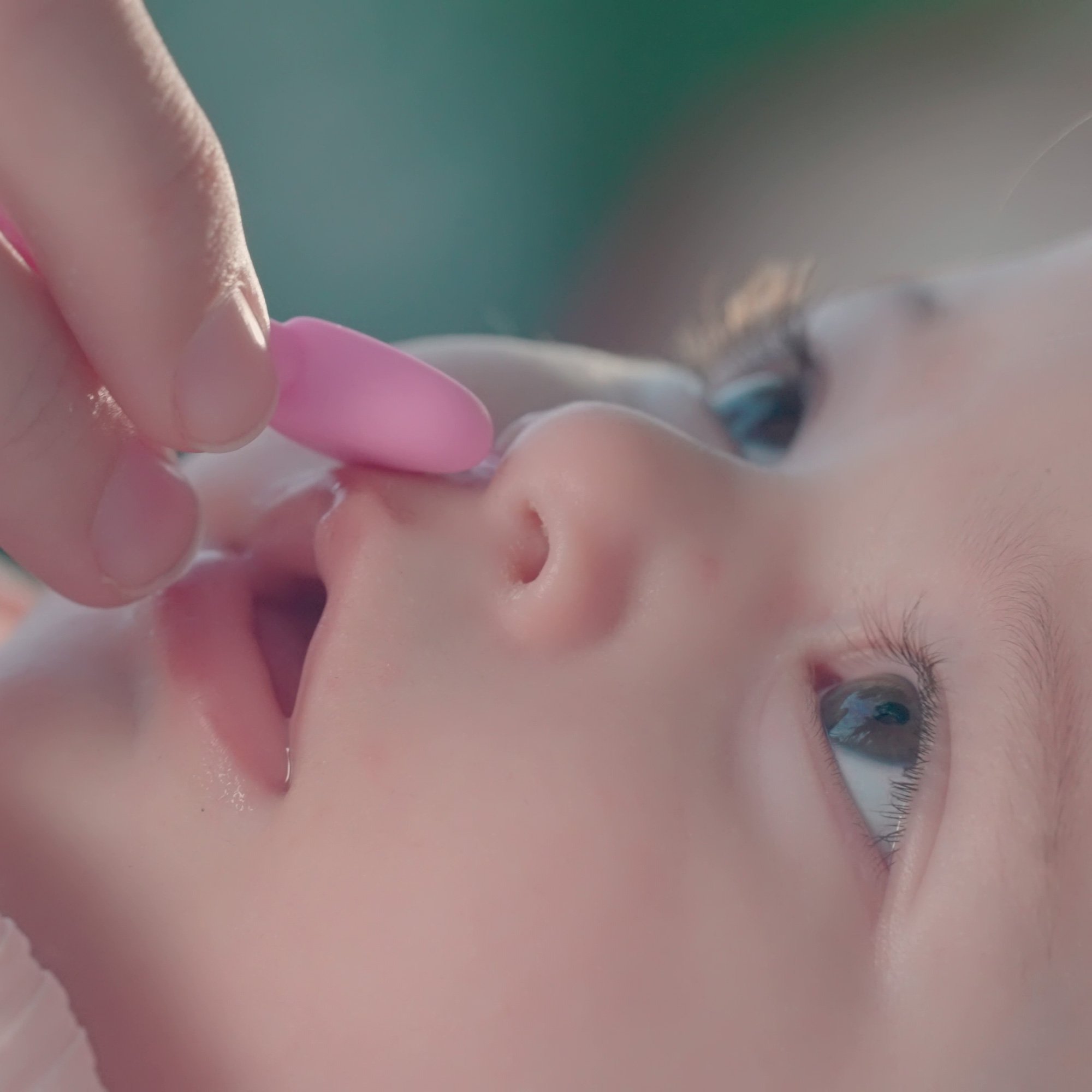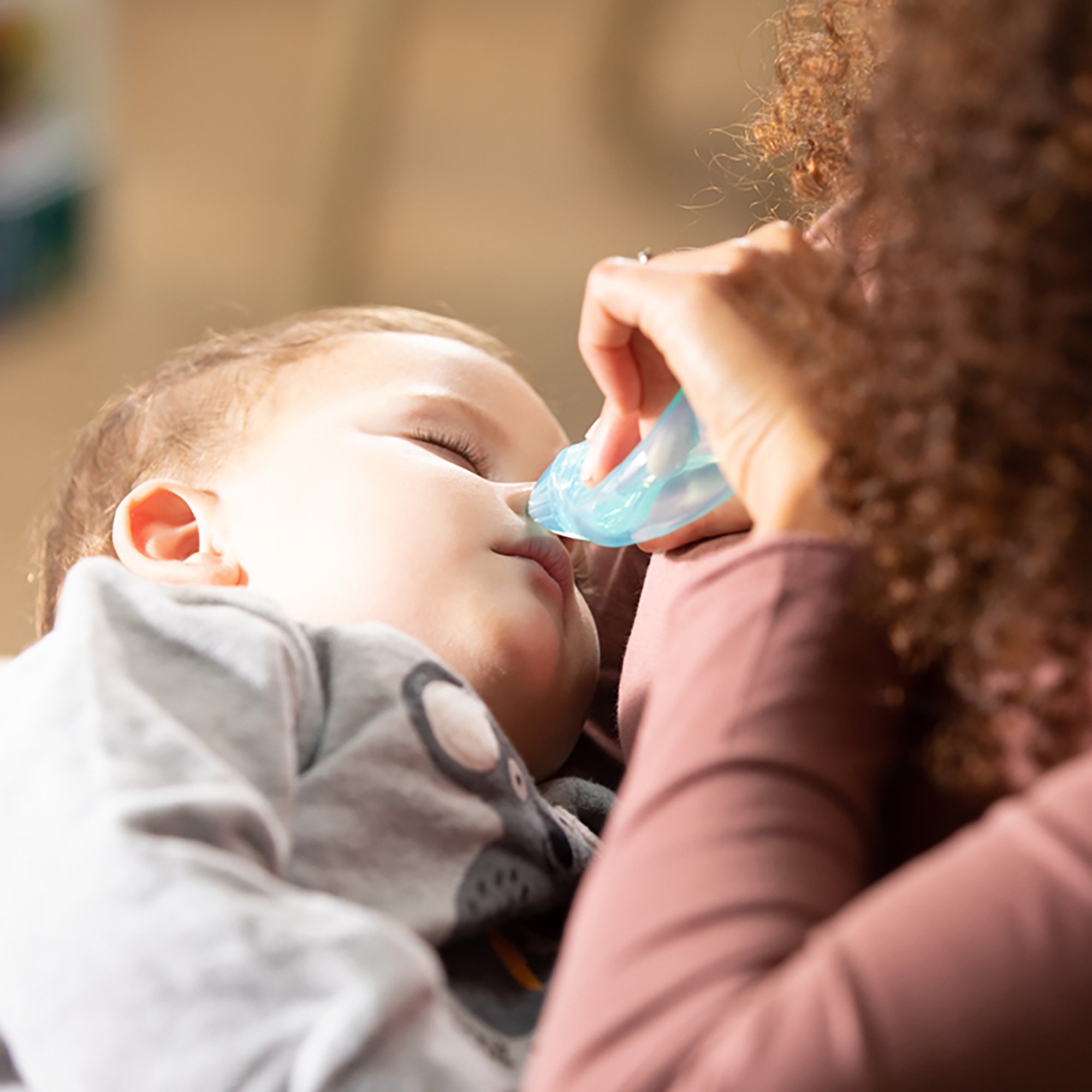Newborn Congestion: Causes & Best Remedies for a Stuffy Nose
Does your newborn sound snuffly, congested, or have a runny nose? Wondering how to clear congestion in a newborn baby? As a new mom, you may panic and rush your child to a medical facility. While it's okay to stress and get a pediatrician review, you can take care of a newborn with congestion at home.
Newborn congestion is common, and you can resolve it with home remedies. Yes! You read that right. A newborn's congested nose results from swollen tissues around the small nasal passage or increased mucus production by the body.

The baby's body produces mucus to trap and remove irritants like dust and scents. The excess mucus blocks the nasal passage, making it sound stuffy. Newborns breathe through the nose. Since they cannot cough to clear the blockage, you can use a steam humidifier, saline drops/spray, or a nasal aspirator to ease the congestion.
However, there may be instances when congestion signals a health concern. We will explore when to worry about newborn congestion, its causes, and effective relief methods.
Causes of Newborn Congestion
It's common to see a newborn with congestion in the first weeks after birth. As mentioned earlier, newborns have small air passages and are prone to congestion. There are several causes of newborn congestion. On the bright side, you can manage the congestion at home or contact the pediatrician if the congestion takes longer to clear.
So, why is my newborn congested?
| Residue of the amniotic fluid | The amniotic fluid can enter the tiny nasal passage at birth, leading to congestion within the first few days. |
| Small Nasal Passage | A newborn's congested nose can result from the body producing mucus to fight and remove irritants like viruses. Since the baby's nasal passage is tiny and still developing, the extra mucus causes a stuffy nose. Newborns breathe through the nose. The congestion can be caused by the extra mucus or inflammation of the nasal tissues. |
| Dry Air | Heaters and air conditioners may irritate the lining of the newborn's nose. The dry air can dry the nasal passage and cause it to swell, leading to congestion. Weather changes may also contribute to congestion in newborns. Low humidity and dry air can lead to inflammation and congestion. |
| Reflux | Newborns with acid reflux and spitting are prone to congestion. The spit can be ejected through the nose and mouth. When it passes through the nose, it irritates the nasal passage, causing congestion. When the baby sounds congested but the nose does not have mucus, it could be due to inflammation or a narrow airway. |
| Allergies | Newborns are sensitive to dust, pollen, pet dander, and fragrances. They can irritate the nasal passage, leading to sneezing and nasal congestion. |
| Viral Infections | Since the baby's immune system is still developing, they are prone to colds and viral infections. When a newborn catches a cold, the nose produces extra mucus to fight the virus, causing congestion. |
| Premature Babies | Preemie babies are more prone to congestion. The nasal airway in a preemie is smaller and more delicate than that of a full-term newborn baby. Seek medical attention if the congestion is accompanied by other symptoms such as fever or vomiting. |
Symptoms of Newborn Congestion
There are various signs to look out for and identify if your newborn is congested. Since newborns can not use words to tell you if they are congested, these are the symptoms to look out for:
1. Noisy Breathing
Noisy breathing is one of the common signs. When a newborn is congested, they may make snorting, wheezing, and snuffling sounds. It is a result of a blocked or narrow nasal passage.
However, if the baby has fast or labored breathing and difficulty feeding, it could signal a medical issue. The baby could be having difficulty breathing, which requires a medical diagnosis.
Runny Nose
Visible mucus on the newborn's nostrils helps to keep the baby's nose moist. It's a sign of a congested baby. The mucus can also appear colored. A baby could be working hard to breathe, which is signaled by flaring nostrils. It's best to call your baby's doctor for a consultation.
Trouble Feeding
A newborn breathes through the nose. When the baby is congested, it causes mild feeding difficulty. The baby feeds and pauses to catch a breath. If the feeding difficulty persists or is accompanied by dehydration, it's best to consult the pediatrician.
Mild Cough or Sneezing
Congestion in newborns may cause them to cough or sneeze. It helps to clear the airway. The mild coughs happen when the mucus runs down the throat.
Newborn Congestion Relief: Safe Home Remedies
It's not easy watching your little one suffer from congestion. The following home remedies will help ease the congestion at home and get your newborn to breathe better.

How to clear congestion in a newborn:
| Nasal Suction Tools | Nasal suction tools remove mucus from the newborn's nose, making it easier for them to feed and breathe. You can use traditional bulb suction or electric nasal aspirators. You can have both or buy one that's convenient for you. For an aspirator, place one end of the tube in the baby's nose and the other in your mouth, then pull the mucus. Nasal aspirators are different. You can use an electric one, like Dr. Talbot's electric nasal aspirator, to clear a stuffy nose. A nasal aspirator is best for heavy congestion without loosening the mucus. A syringe bulb, like Dr. Talbot's Elephant nasal aspirator, has a silicone body and is easy to squeeze to remove mucus and boogers. The advantage of using these tools is that they are portable, easy to use, and effective in providing newborn congestion relief. |
| Saline Drops | Contact your pediatrician before buying saline drops for your congested newborn. Adding two drops or one drop to each nostril loosens the mucus. Use a nasal suction tool to remove the mucus. |
| Run a Humidifier | Place a humidifier in the baby's room, especially when they sleep. A humidifier adds moisture to the dry air, loosens the mucus, and relieves congestion. Use plain water for the humidifier. |
| Hold the baby in an upright position | Hold the baby in an elevated position during and after feeding to help drain mucus and improve breathing. |
| Hydration | Newborns should be fed regularly, about every 2 hours. Whether breastfeeding or formula feeding, feed your baby more frequently, especially if the congestion makes it harder to feed. Newborns do not need extra water. Keeping your baby hydrated thins the mucus and clears congestion. Use a nasal aspirator or syringe bulb to remove mucus before feeding. |
How to Help a Congested Newborn Sleep Better
It can be difficult for a congested newborn to sleep. Since babies do not know how to breathe with their mouths, a little help goes a long way. Place a humidifier in the baby's room to keep the air moist. Dry air irritates the nasal passage.
Avoid overheating the room. Overheating a room can worsen congestion. It dries the air and irritates the nasal passage. A baby should sleep in a comfortable environment. An example is placing a humidifier with plain water in the baby's room.
Also, not overdress the newborn. Dress the baby lightly. Avoid covering the baby in heavy blankets.
Lastly, ensure the ideal room temperature for the newborn is about 68-72°F. If you're unsure of a safe sleeping method for your baby, consult a pediatrician.
When To Worry About Newborn Congestion
Always trust your instincts. While congestion is common, some cases will cause you to worry. The congestion can sometimes clear on its own, or with home remedies. But, always consult a pediatrician if you have any concerns.
Consult a pediatrician. They will advise you on how to relieve congestion or to visit an ER. When is congestion a reason for worry for a newborn?
1. Breathing difficulty
A congested newborn may have difficulty breathing. Since the nasal passage is partially blocked, it could lead to fast breathing.
If your newborn sounds congested, has fast breathing, flaring nostrils with each breath, grunting sounds when exhaling, or has noticeable efforts when breathing, contact a pediatrician.